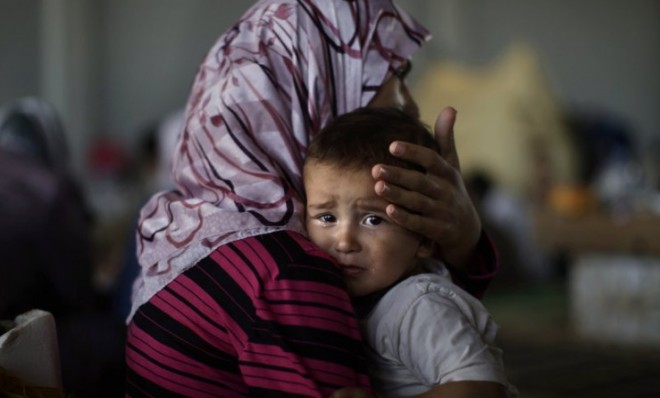Syria's deepening humanitarian crisis: By the numbers
Between the civil war, winter weather, and global indifference, Syria is rapidly sliding toward disaster


A free daily email with the biggest news stories of the day – and the best features from TheWeek.com
You are now subscribed
Your newsletter sign-up was successful
Nobody, it seems, was impressed with Syrian President Bashar al-Assad's speech on Sunday laying out his plan to end the bloody 22-month conflict pitting Assad's government against armed rebels trying to topple him. United Nations Secretary General Ban Ki-moon dismissed Assad's proposal as a thinly veiled effort to stay in power, and the U.S. State Department said the speech shows that Assad is "detached from reality." But the unpalatable reality, says Simon Tisdall at Britain's The Guardian, is that "Assad is still in power, shows no sign of heeding demands to quit, and is far from beaten," and Syrians are paying the price. That price, according to the U.N., is a huge and growing humanitarian crisis, exacerbated by fuel shortages and a lack of aid organizations able to work in the country. A look at Syria's deepening disaster, by the numbers:
60,000
Estimated number of Syrians killed since Assad started cracking down on protesters in March 2011
The Week
Escape your echo chamber. Get the facts behind the news, plus analysis from multiple perspectives.

Sign up for The Week's Free Newsletters
From our morning news briefing to a weekly Good News Newsletter, get the best of The Week delivered directly to your inbox.
From our morning news briefing to a weekly Good News Newsletter, get the best of The Week delivered directly to your inbox.
2,727
Average deaths a month
1.5 million
Hunger-plagued Syrians being fed by the U.N.'s World Food Program and its partners
A free daily email with the biggest news stories of the day – and the best features from TheWeek.com
1 million
Hunger-plagued Syrians in need of food aid that the WFP and its partners are unable to reach
$1.5 billion
Amount the U.N. is requesting to tackle Syria's growing humanitarian crisis
$519 million
Share of that money earmarked for people inside Syria in need of urgent humanitarian aid
4 million
Syrians inside the country who need urgent humanitarian aid
2 million
Number of those Syrians who have been displaced from their homes
$1 billion
Share of the U.N.-sought money for Syrian refugees in Jordan, Iraq, Lebanon, Turkey, and Egypt
597,240
Syrian refugees in those countries as of Jan. 6
509,559
Syrian refugees in those countries on Dec. 11, 2012
54,000
Syrians in Jordan's Zaatari refugee camp, where violence broke out this week after winter storms blew away tents and flooded parts of the camp
9,000
Refugees entering the Zaatari camp in the past week
$16 (25,000 Lebanese pounds)
Amount Lebanon is reportedly charging each Syrian Palestinian for a 14-day visa
$3.50 (250 Syrian pounds)
Cost of 2.2 pounds of bread in Aleppo, 50 percent higher than other parts of Syria and six times the price before the civil war started
0.27
Estimated percentage of Syria's population killed in the civil war so far
0.58
Estimated percentage of the Yugoslavian population killed in the bloody 1991-99 civil war (140,000 deaths)
2.01
Estimated percentage of the Spanish population killed in the 1936-39 civil war (500,000 deaths)
1.97
Estimated percentage of the U.S. population killed in the 1861-65 American Civil War (618,222 deaths)
Sources: CNN, Fox News, The Guardian (2), The New York Times, Scoop, VOA News
Peter has worked as a news and culture writer and editor at The Week since the site's launch in 2008. He covers politics, world affairs, religion and cultural currents. His journalism career began as a copy editor at a financial newswire and has included editorial positions at The New York Times Magazine, Facts on File, and Oregon State University.
-
 Sepsis ‘breakthrough’: the world’s first targeted treatment?
Sepsis ‘breakthrough’: the world’s first targeted treatment?The Explainer New drug could reverse effects of sepsis, rather than trying to treat infection with antibiotics
-
 James Van Der Beek obituary: fresh-faced Dawson’s Creek star
James Van Der Beek obituary: fresh-faced Dawson’s Creek starIn The Spotlight Van Der Beek fronted one of the most successful teen dramas of the 90s – but his Dawson fame proved a double-edged sword
-
 Is Andrew’s arrest the end for the monarchy?
Is Andrew’s arrest the end for the monarchy?Today's Big Question The King has distanced the Royal Family from his disgraced brother but a ‘fit of revolutionary disgust’ could still wipe them out
